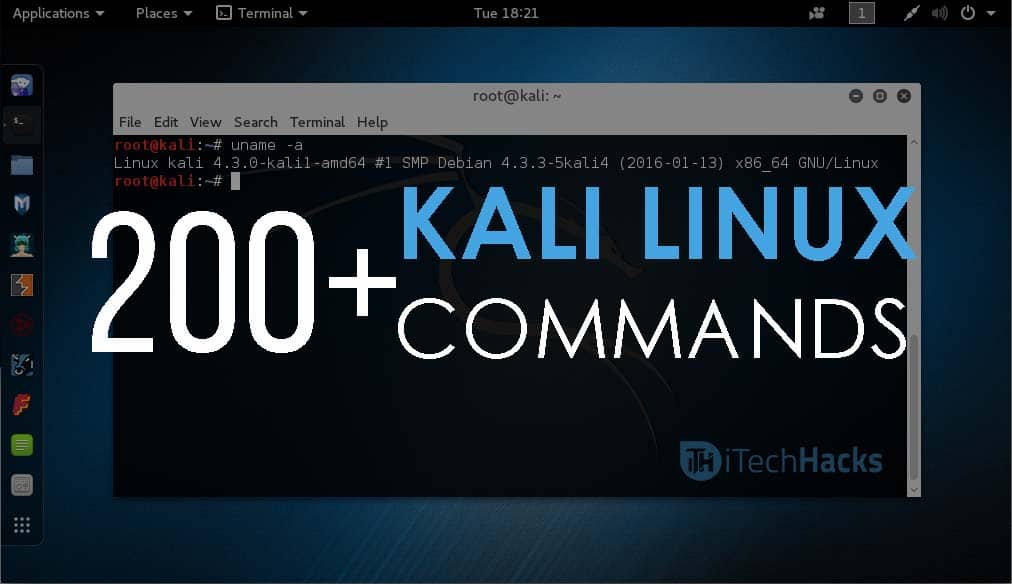- Kali Linux is a favored operating system for solving day-to-day issues and security assignments, not just for hacking.
- It comes with over 300 penetration-testing programs preinstalled, including tools like Armitage, Nmap, and Wireshark.
- Kali Linux supports various devices and Linux commands, with a PDF available for download containing a comprehensive list of over 200 Linux commands for programming and hacking purposes.
Kali Linux and UNIX is one of my all-time favorite operating systems. Not for Hacking, but its open-source platform let me help to solve many days to day issues, helps to prepare security assignments, and much more. if you are a habitual user of Linux then this Linux Commands Line list would amaze you for sure.

Kali Linux is a Debian-derived Linux distribution that is designed for digital forensics and penetration testing. It comes with over 300 penetration-testing programs preinstalled in it. These programs include Armitage which is a graphical cyber attack management tool, Nmap which is a port scanner, Wireshark which is a packet analyzer, etc.
What is Kali Linux?
Kali Linux is an OS that hackers chooses first. Well, Linux is an open-source operating system in which Kali Linux functions when it is installed on a computer’s hard disc but you require a minimum of 20GB hard disk space to install in on your computer, it can also be booted by using a CD or USB. Kali Linux is a supported platform of the Metasploit Project’s Metasploit Framework, a tool for developing and executing security exploits.
Linux has a custom-built kernel that is patched for 802.11 wireless injections. This was added because the developers found out that they needed to do a lot of wireless assessments. Kali Linux is available for many devices such as BeagleBone Black, EfikaMX, HP Chromebook, CuBox, CuBox-i, Odroid U2, Odroid XU, Odroid XU3, Samsung Chromebook, Galaxy Note 10.1, CubieBoard 2, Raspberry Pi, Utilite Pro, and SS808.
As Kali NetHunter is introduced, Kali Linux is also officially available on many devices such as the Nexus 5, Nexus 7, Nexus 9, Nexus 10, OnePlus One, and Samsung Galaxy models. For using the Kali Linux, you must know the Linux commands. If you do not know the Kali Linux commands thoroughly, you will end up strangled in one particular place. Hence, here we are going to provide you with the most commonly used commands and also, explain what they will do for you. The list of these commands is very long so let’s get started without wasting any more time.
Kali Linux and Linux Commands Line List
Linux Command List: Here we have listed top 100+ most used and unknown Linux Commands that you can use for programming and hacking purpose. “Linux Commands Line Cheat Sheet”
| Linux Command | Functions |
|---|---|
| apropos | Search Help manual pages (man -k) |
| apt-get | Search for and install software packages (Debian) |
| aptitude | Search for and install software packages (Debian) |
| aspell | Spell Checker |
| awk | Find and Replace text, database sort/validate/index |
| basename | Strip directory and suffix from filenames |
| bash | GNU Bourne-Again Shell |
| bc | Arbitrary precision calculator language |
| bg | Send to background |
| break | Exit from a loop |
| builtin | Run a shell builtin |
| bzip2 | Compress or decompress named files |
| cal | Display a calendar |
| case | Conditionally perform a command |
| cat | Concatenate and print (display) the content of files |
| cd | Change Directory |
| cfdisk | Partition table manipulator for Linux |
| chgrp | Change group ownership |
| chkconfig | System services (runlevel) |
| chmod | Change access permissions |
| chown | Change file owner and group |
| chroot | Run a command with a different root directory |
| cksum | Print CRC checksum and byte counts |
| clear | Clear terminal screen |
| cmp | Compare two files |
| comm | Compare two sorted files line by line |
| command | Run a command – ignoring shell functions |
| continue | Resume the next iteration of a loop |
| cp | Copy one or more files to another location |
| cron | Daemon to execute scheduled commands |
| crontab | Schedule a command to run at a later time |
| csplit | Split a file into context-determined pieces |
| cut | Divide a file into several parts |
| date | Display or change the date and time |
| dc | Desk Calculator |
| dd | Convert and copy a file, write disk headers, boot records |
| ddrescue | Data recovery tool |
| declare | Declare variables and give them attributes |
| df | Display free disk space |
| diff | Display the differences between two files |
| diff3 | Show differences among three files |
| dig | DNS lookup |
| dir | Briefly list directory contents |
| dircolors | Colour setup for `ls’ |
| dirname | Convert a full pathname to just a path |
| dirs | Display list of remembered directories |
| dmesg | Print kernel & driver messages |
| du | Estimate file space usage |
| echo | Display message on screen |
| egrep | Search files for lines that match an extended expression |
| eject | Eject removable media |
| enable | Enable and disable builtin shell commands |
| env | Environment variables |
| ethtool | Ethernet card settings |
| eval | Evaluate several commands/arguments |
| exec | Execute a command |
| exit | Exit the shell |
| expand | Convert tabs to spaces |
| expect | Automate arbitrary applications accessed over a terminal |
| export | Set an environment variable |
| expr | Evaluate expressions |
| fdformat | Low-level format a floppy disk |
| fdisk | Partition table manipulator for Linux |
| fg | Send job to foreground |
| fgrep | Search files for lines that match a fixed string |
| file | Determine file type |
| find | Search for files that meet a desired criteria |
| fmt | Reformat paragraph text |
| fold | Wrap text to fit a specified width |
| for | Expand words, and execute commands |
| format | Format disks or tapes |
| free | Display memory usage |
| fsck | File system consistency check and repair |
| ftp | File Transfer Protocol |
| function | Define Function Macros |
| fuser | Identify/kill the process that is accessing a file |
| gawk | Find and Replace text within files |
| getopts | Parse positional parameters |
| grep | Search files for lines that match a given pattern |
| groupadd | Add a user security group |
| groupdel | Delete a group |
| groupmod | Modify a group |
| groups | Print group names a user is in |
| gzip | Compress or decompress named files |
| hash | Remember the full pathname of a name argument |
| head | Output the first part of files |
| help | Display help for a built-in command |
| history | Command History |
| hostname | Print or set system name |
| iconv | Convert the character set of a file |
| id | Print user and group id’s |
| if | Conditionally perform a command |
| ifconfig | Configure a network interface |
| ifdown | Stop a network interface |
| ifup | Start a network interface up |
| import | Capture an X server screen and save the image to file |
| install | Copy files and set attributes |
| jobs | List active jobs |
| join | Join lines on a common field |
| kill | Stop a process from running |
| killall | Kill processes by name |
| less | Display output one screen at a time |
| let | Perform arithmetic on shell variables |
| ln | Create a symbolic link to a file |
| local | Create variables |
| locate | Find files |
| logname | Print current login name |
| logout | Exit a login shell |
| look | Display lines beginning with a given string |
| lpc | Line printer control program |
| lpr | Off line print |
| lprint | Print a file |
| lprintd | Abort a print job |
| lprintq | List the print queue |
| lprm | Remove jobs from the print queue |
| ls | List information about files |
| lsof | List open files |
| make | Recompile a group of programs |
| man | Help manual |
| mkdir | Create new folders |
| mkfifo | Make FIFOs (named pipes) |
| mkisofs | Create an hybrid ISO9660/JOLIET/HFS filesystem |
| mknod | Make block or character special files |
| mmv | Mass Move and rename files |
| more | Display output one screen at a time |
| mount | Mount a file system |
| mtools | Manipulate MS-DOS files |
| mtr | Network diagnostics (traceroute/ping) |
| mv | Move or rename files or directories |
| netstat | Networking information |
| nice | Set the priority of a command or job |
| nl | Number lines and write files |
| nohup | Run a command immune to hangups |
| notify-send | Send desktop notifications |
| nslookup | Query Internet name servers interactively |
| op | Operator access |
| open | Open a file in its default application |
| passwd | Modify a user password |
| paste | Merge lines of files |
| pathchk | Check file name portability |
| ping | Test a network connection |
| pkill | Stop processes from running |
| popd | Restore the previous value of the current directory |
| pr | Prepare files for printing |
| printcap | Printer capability database |
| printenv | Print environment variables |
| printf | Format and print data |
| ps | Process status |
| pushd | Save and then change the current directory |
| pwd | Print Working Directory |
| quota | Display disk usage and limits |
| quotacheck | Scan a file system for disk usage |
| quotactl | Set disk quotas |
| ram | ram disk device |
| rcp | Copy files between two machines |
| read | Read a line from standard input |
| readarray | Read from stdin into an array variable |
| readonly | Mark variables/functions as readonly |
| reboot | Reboot the system |
| remsync | Synchronize remote files via email |
| rename | Rename files |
| renice | Alter priority of running processes |
| return | Exit a shell function |
| rev | Reverse lines of a file |
| rm | Remove files |
| rmdir | Remove folders |
| rsync | Remote file copy (Synchronize file trees) |
| scp | Secure copy (remote file copy) |
| screen | Multiplex terminal, run remote shells via ssh |
| sdiff | Merge two files interactively |
| sed | Stream Editor |
| select | Accept keyboard input |
| seq | Print numeric sequences |
| set | Manipulate shell variables and functions |
| sftp | Secure File Transfer Program |
| shift | Shift positional parameters |
| shopt | Shell Options |
| shutdown | Shutdown or restart linux |
| sleep | Delay for a specified time |
| slocate | Find files |
| sort | Sort text files |
| source | Run commands from a file |
| split | Split a file into fixed-size pieces |
| ssh | Secure Shell client (remote login program) |
| strace | Trace system calls and signals |
| su | Substitute user identity |
| sudo | Execute a command as another user |
| sum | Print a checksum for a file |
| suspend | Suspend execution of this shell |
| symlink | Make a new name for a file |
| sync | Synchronize data on disk with memory |
| tail | Output the last part of file |
| tar | Tape Archiver |
| tee | Redirect output to multiple files |
| test | Evaluate a conditional expression |
| time | Measure Program running time |
| times | User and system times |
| top | List processes running on the system |
| touch | Change file timestamps |
| tr | Translate, squeeze, and/or delete characters |
| traceroute | Trace Route to Host |
| trap | Run a command when a signal is set(bourne) |
| true | Do nothing, successfully |
| tsort | Topological sort |
| tty | Print filename of terminal on stdin |
| type | Describe a command |
| ulimit | Limit user resources |
| umask | Users file creation mask |
| umount | Unmount a device |
| unalias | Remove an alias |
| uname | Print system information |
| unexpand | Convert spaces to tabs |
| uniq | Uniquify files |
| units | Convert units from one scale to another |
| unset | Remove variable or function names |
| unshar | Unpack shell archive scripts |
| until | Execute commands (until error) |
| uptime | Show uptime |
| useradd | Create new user account |
| usermod | Modify user account |
| users | List users currently logged in |
| uudecode | Decode a file created by uuencode |
| uuencode | Encode a binary file |
| v | Verbosely list directory contents (`ls -l -b’) |
| vdir | Verbosely list directory contents (`ls -l -b’) |
| vi | Text Editor |
| vmstat | Report virtual memory statistics |
| wait | Wait for a process to complete |
| watch | Execute/display a program periodically |
| wc | Print byte, word, and line counts |
| wget | Retrieve web pages or files via HTTP, HTTPS or FTP |
| whereis | Search the user’s $path, man pages and source files for a program |
| which | Search the user’s $path for a program file |
| while | Execute commands |
| who | Print all usernames currently logged in |
| whoami | Print the current user id and name (`id -un’) |
| write | Send a message to another user |
| xargs | Execute utility, passing constructed argument lists |
| xdg-open | Open a file or URL in the user’s preferred application |
| yes | Print a string until interrupted |
Download Kali Linux Commands PDF
Also Read: Top 200+ Best CMD Tricks, Tips And Hacks
Wrap Up: Well, This is a big list of Most Successful and Working Linux Commands or Kali Linux Commands 202 PDF. We hope this pretty awesome list would be beneficial for you and you can easily use these Command lines on Kali Linux OS. Anyways, there may be a possibility that we have forgotten any Kali Linux Command Line then you can comment below. We will add them also here.









How to learning Kali os with hacking
Super!